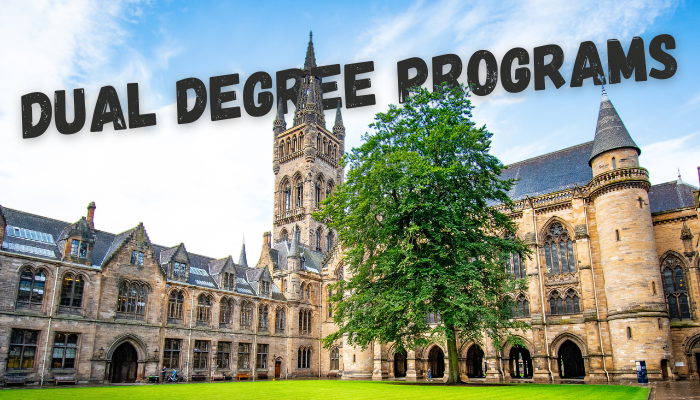


What Are Dual-Degree Programs in International Universities?
There has been a significant rise in the popularity of dual-degree programs offered by international universities. These programs provide students with the opportunity to obtain qualifications from multiple institutions, often in different countries, thereby enriching their academic experience and enhancing their career prospects. This article explores the reasons behind the increasing demand for dual-degree programs and highlights their benefits for students seeking a abroad education.
Dual-degree programs, also known as double-degree or joint-degree programs, allow students to pursue two separate degrees simultaneously. These programs are typically offered in collaboration between two or more universities, enabling students to access the resources and expertise of each institution. In the context of international universities, dual-degree programs often involve partnerships between institutions located in different countries, offering students the opportunity to study and earn qualifications from diverse cultural and academic perspectives.
The Benefits of Dual-Degree Programs in International Universities
- Global Perspective: Dual-degree programs in international universities expose students to diverse cultures, languages, and academic systems, providing them with a global perspective that is increasingly valued in today’s interconnected world.
- Enhanced Career Opportunities: Graduates of dual-degree programs are equipped with a unique set of skills and experiences that make them attractive to employers in multinational corporations, international organizations, and global industries.
- Expanded Professional Network: Through participation in dual-degree programs, students have the opportunity to build a global network of peers, mentors, and professionals, which can prove invaluable in their future careers.
- Cultural Immersion: Studying in multiple countries as part of a dual-degree program allows students to immerse themselves in different cultures, broadening their horizons and fostering intercultural understanding and appreciation.
The Growing Demand for Dual-Degree Programs
The increasing globalization of higher education and the growing demand for graduates with international experience have contributed to the rising popularity of dual-degree programs. As employers seek candidates who can navigate complex global challenges and collaborate across cultural boundaries, students are recognizing the value of pursuing qualifications that reflect their intercultural competencies and adaptability.
Factors Driving the Growth of Dual-Degree Programs
The surge in dual-degree programs is propelled by several key factors. Globalization demands graduates with cross-cultural competence and adaptability. Academic excellence drives collaboration between prestigious universities. Personal development opportunities arise from immersion in diverse environments. Networking benefits attract students seeking global connections. Overall, the growth reflects a shift towards holistic education, preparing students for success in an increasingly interconnected world.
- Employability: In an increasingly competitive job market, students are seeking ways to differentiate themselves and enhance their employability. Dual-degree programs offer a unique opportunity to acquire specialized knowledge and skills while demonstrating flexibility and cultural awareness to potential employers.
- Academic Excellence: Many dual-degree programs are offered in collaboration between prestigious universities known for their academic excellence. By participating in these programs, students can benefit from the expertise of leading scholars and researchers in their field of study abroad.
- Personal Development: Studying in multiple countries as part of a dual-degree program can be a transformative experience, challenging students to step outside their comfort zones, adapt to new environments, and develop resilience and independence.
- Networking Opportunities: Dual-degree programs provide students with access to a diverse and global network of peers, faculty members, and industry professionals, offering valuable opportunities for collaboration, mentorship, and career advancement.
The growing trend of dual-degree programs in international universities reflects the evolving needs and aspirations of students in an increasingly interconnected world. By offering the opportunity to gain qualifications from multiple institutions and cultures, these programs prepare graduates to thrive in diverse and dynamic global environments. As the demand for graduates with international experience continues to rise, dual-degree programs are likely to remain a popular choice for students seeking a truly global education.
Frequently Asked Questions
1. What is a dual-degree program?
A dual-degree program, also known as a double-degree or joint-degree program, allows students to pursue two separate degrees simultaneously. These programs are often offered in collaboration between two or more universities, providing students with the opportunity to earn qualifications from multiple institutions, typically in different countries.
2. How do dual-degree programs differ from traditional degree programs?
Unlike traditional degree programs, which typically focus on a single area of study, dual-degree programs offer students the opportunity to gain expertise in two complementary fields. Additionally, dual-degree programs often involve studying in multiple countries, providing students with a global perspective and exposure to diverse cultures and academic systems.
3. What are the benefits of participating in a dual-degree program?
Dual-degree programs offer a range of benefits, including enhanced career opportunities, exposure to diverse cultures, expanded professional networks, and personal development. Graduates of dual-degree programs are equipped with a unique set of skills and experiences that make them attractive to employers in today’s globalized job market.
4. How long does it take to complete a dual-degree program?
The duration of a dual-degree program can vary depending on the specific program and the institutions involved. In general, dual-degree programs take longer to complete than traditional degree programs due to the additional coursework and requirements involved in earning two separate degrees. However, some programs may offer accelerated or condensed options for motivated students.
5. Are dual-degree programs recognized internationally?
Yes, dual-degree programs offered by reputable international universities are typically recognized and respected worldwide. Students who complete dual-degree programs receive qualifications from each of the participating institutions, enhancing their credentials and demonstrating their ability to succeed in diverse academic and professional environments.



